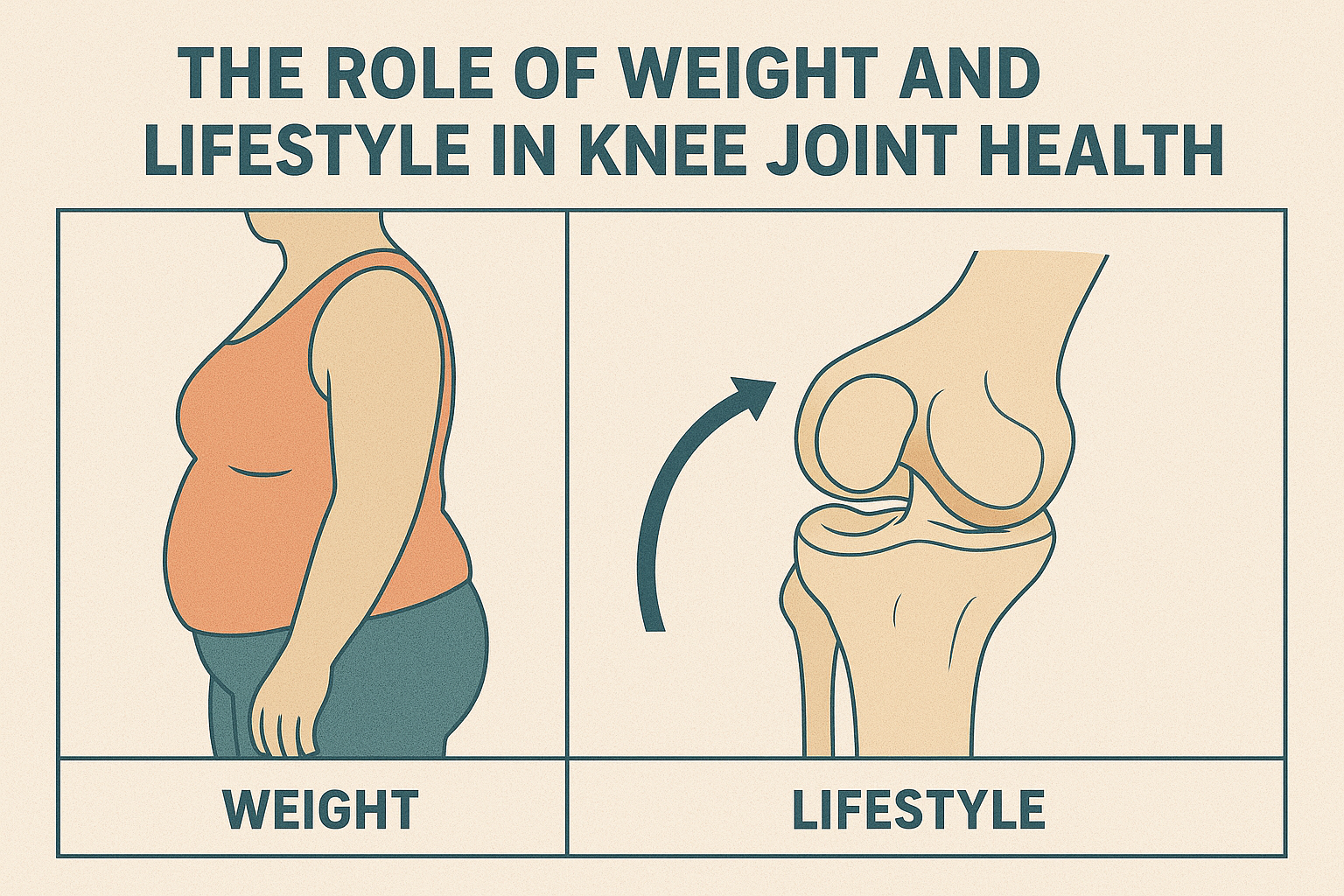Knee pain is one of the most common complaints affecting people of all ages. Whether due to injury, arthritis, or overuse, our lifestyle choices and body weight play a critical role in the health and longevity of the knee joints. Understanding this connection can help us take simple yet powerful steps to protect our knees and maintain mobility throughout life.
Why Weight Matters for Knee Health
The knees are weight-bearing joints that carry the load of our entire body. Even a small increase in body weight significantly multiplies the stress on the knees. For example, every extra kilogram of weight can add up to four times more pressure on the knee joint during walking or climbing stairs. Over time, this added strain accelerates wear and tear, increasing the risk of conditions like osteoarthritis and chronic knee pain.
Lifestyle Factors That Influence Knee Health
1. Physical Activity and Exercise
Movement is medicine for the knees. Regular exercise helps strengthen the muscles that support the joint, particularly the quadriceps and hamstrings, reducing pressure on the cartilage. Low-impact activities such as swimming, cycling, and yoga improve flexibility and endurance without overstraining the knees. Conversely, a sedentary lifestyle weakens muscles and stiffens joints, making the knees more prone to injury.
2. Weight Management
Excess weight is one of the biggest enemies of knee health. Every extra kilogram of body weight adds several kilos of pressure to the knee joint during walking, running, or climbing stairs. Over time, this extra strain accelerates wear and tear, leading to osteoarthritis and chronic knee pain. Maintaining a healthy weight reduces stress and preserves joint function.
3. Diet and Nutrition
What we eat directly impacts our joints. A diet rich in calcium and vitamin D supports bone strength, while omega-3 fatty acids from fish, nuts, and seeds help reduce inflammation. Antioxidant-rich fruits and vegetables protect cartilage from damage. On the other hand, diets high in sugar and processed foods can trigger inflammation that worsens joint problems.
4. Posture and Movement Habits
The way we move daily—whether standing, sitting, or lifting—affects our knees more than we realize. Poor posture, repetitive squatting, or carrying heavy loads incorrectly places unnecessary strain on the joint. Practicing proper body mechanics, wearing supportive footwear, and avoiding prolonged sitting or standing can make a significant difference.
5. Smoking and Alcohol
Lifestyle habits such as smoking and excessive alcohol consumption interfere with blood circulation and bone health. Smoking reduces oxygen supply to tissues, slowing recovery, while alcohol weakens bone density. Both habits make knees more vulnerable to injury and degeneration.
6. Rest and Recovery
Just as exercise strengthens the knees, rest allows them to heal. Overexertion without adequate recovery leads to joint stress and injuries. Balancing activity with proper rest ensures long-term joint resilience.
Key Lifestyle Changes to Protect Your Knees
1. Maintain a Healthy Weight
Excess body weight is one of the biggest contributors to knee pain. Every extra kilogram adds several kilos of stress on your knees during movement. Shedding even a small amount of weight can ease pressure, improve mobility, and lower the risk of osteoarthritis.
2. Stay Physically Active
Exercise is essential for keeping knee-supporting muscles strong. Activities like walking, swimming, and cycling strengthen muscles without putting excess strain on the joints. Stretching and yoga help improve flexibility, reducing stiffness and injury risk.
3. Build Muscle Strength
Strong quadriceps, hamstrings, and calf muscles act like shock absorbers for the knees. Strength training, resistance exercises, and balance workouts enhance joint stability and protect against injury.
4. Adopt Joint-Friendly Movement Habits
Avoid frequent squatting, deep kneeling, or carrying heavy loads with poor posture. Use proper techniques when lifting and wear supportive footwear to keep knees aligned and reduce stress.
5. Focus on Nutrition
A balanced diet rich in calcium, vitamin D, and omega-3 fatty acids supports bone density and reduces inflammation. Fresh fruits, vegetables, whole grains, and lean proteins contribute to overall joint health. Limiting processed and sugary foods helps prevent systemic inflammation that can worsen joint pain.
6. Avoid Harmful Habits
Smoking and excessive alcohol consumption interfere with bone healing and circulation, making knees more vulnerable to damage. Cutting back on these habits improves both joint and overall health.
7. Allow Rest and Recovery
Overexertion without proper rest increases the risk of injuries. Give your knees recovery time, especially after intense physical activity. Balanced rest is just as important as regular exercise.
Conclusion
Knee joint health is not only about treating pain when it arises—it’s about prevention through mindful lifestyle choices. By maintaining a healthy weight, staying active, and adopting healthy habits, we can protect our knees, preserve mobility, and enjoy an active life free from debilitating pain.
At Dr. Abhisekh Orthocare, we focus on identifying these root causes with precision and providing advanced, personalized treatment to restore mobility and comfort.

